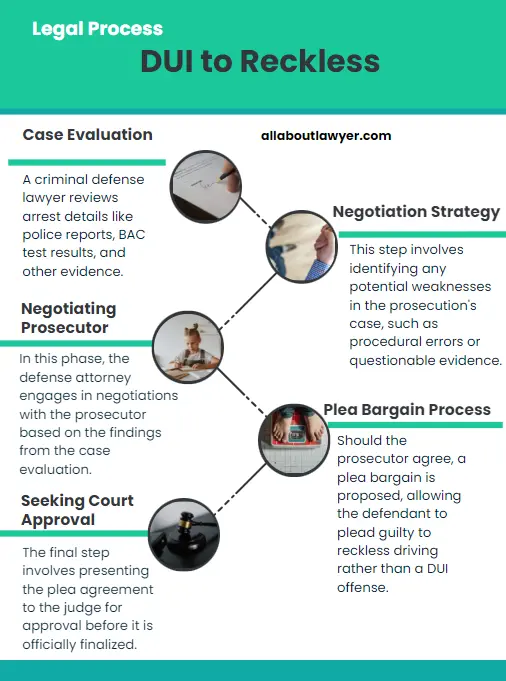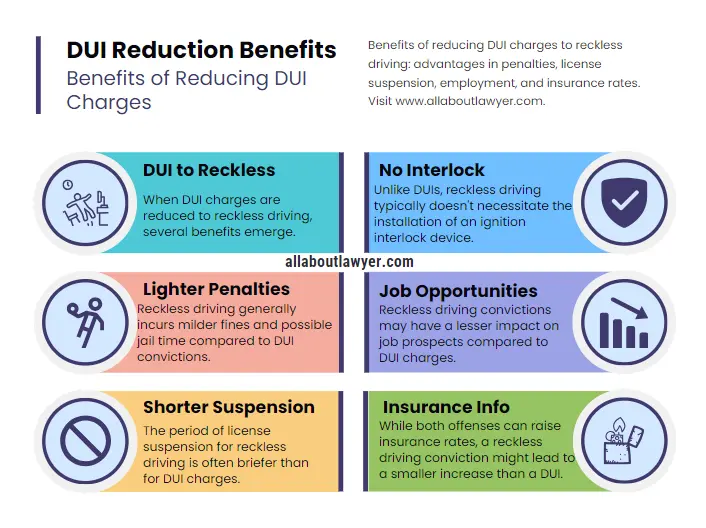DUI Reduced To Reckless Driving Washington State
In the Evergreen State, facing a charge of driving under the influence (DUI) can be a daunting experience. However, in some cases, it may be possible to have a DUI charge reduced to reckless driving. This process, known as a plea bargain or negotiated settlement, can significantly alter the consequences of a conviction. This comprehensive guide will explore the intricacies of having a DUI reduced to reckless driving Washington state, including the legal process, potential benefits, and long-term implications.
Table of Contents
Legal Side of DUI and Reckless Driving in Washington
Before delving into the specifics of charge reduction, it’s essential to understand the basic definitions and legal framework surrounding DUI and reckless driving in Washington State.
Driving Under the Influence (DUI) in Washington
In Washington, a person can be charged with DUI if they operate a motor vehicle while:
1. Having a blood alcohol concentration (BAC) of 0.08% or higher
2. Under the influence of alcohol
3. Under the influence of any drug
4. Under the combined influence of alcohol and drugs
The legal limit for BAC is lower for commercial drivers (0.04%) and drivers under 21 (0.02%). Law enforcement officers use various methods to determine impairment, including breathalyzer tests, field sobriety tests, and chemical testing of blood or urine.
Reckless Driving in Washington State
Reckless driving is defined in Washington as driving a vehicle with willful or wanton disregard for the safety of persons or property. This charge is considered a gross misdemeanor and, while serious, typically carries less severe penalties than a DUI Reduction conviction.
The Process of Reducing a DUI to Reckless Driving
Having a DUI charge reduced to reckless driving is not an automatic process. It involves negotiations between the defense attorney and the prosecutor, taking into account various factors of the case. Here’s an overview of the typical process:
1. Case Evaluation: A criminal defense lawyer will review the details of the arrest, including police reports, BAC test results, and any other relevant evidence.
2. Identifying Weaknesses: The attorney looks for potential weaknesses in the prosecution’s case, such as procedural errors or questionable evidence.
3. Negotiation: Based on the case evaluation, the defense attorney will negotiate with the prosecutor for a charge reduction.
4. Plea Bargain: If the prosecutor agrees, a plea bargain will be offered, allowing the defendant to plead guilty to reckless driving instead of DUI.
5. Court Approval: The judge must approve the plea agreement before it becomes final.

Factors Influencing DUI Reduction in Washington
Several factors can influence whether a DUI Reduction charge might be reduced to reckless driving:
1. BAC Level: Cases with BAC levels close to the legal limit may have a better chance of reduction.
2. Prior Offenses: First-time offenders are more likely to receive a charge reduction than repeat offenders.
3. Conduct During Arrest: Cooperation with law enforcement during the arrest can work in the defendant’s favor.
4. Strength of Evidence: Weak evidence or procedural errors can increase the likelihood of a charge reduction.
5. Presence of Accidents or Injuries: DUI Reduction cases involving accidents or injuries are less likely to be reduced.
6. Prosecutor’s Discretion: Each prosecutor’s office may have different policies regarding plea bargains in DUI cases.
Also read: How To Hire Best Domestic Assault Lawyer Toronto?
Benefits of DUI Reduction to Reckless Driving
Having a DUI charge reduced to reckless driving can offer several advantages:
1. Lighter Penalties: Reckless driving typically carries less severe fines and potential jail time compared to a DUI conviction.
2. Shorter License Suspension: The license suspension period for reckless driving is often shorter than for DUI Reduction.
3. Avoiding Mandatory Ignition Interlock Device: Unlike DUI convictions, reckless driving doesn’t usually require the installation of an ignition interlock device.
4. Employment Implications: A reckless driving conviction may have less impact on employment opportunities compared to a DUI.
5. Insurance Rates: While both offenses can increase insurance rates, a reckless driving conviction may result in a smaller increase than a DUI.

Potential Drawbacks and Considerations
While reducing a DUI to reckless driving can offer benefits, there are some potential drawbacks to consider:
1. Still a Serious Offense: Reckless driving is still a gross misdemeanor in Washington and carries significant penalties.
2. Impact on Future Cases: If charged with DUI in the future, a prior reckless driving conviction could be considered in sentencing.
3. No Guarantee of Reduction: Not all DUI cases qualify for reduction, and the decision ultimately lies with the prosecutor and judge.
4. Potential for Higher Fines: In some cases, the fines for reckless driving could be higher than those for a first-time DUI.
Read also: Can You Get a CDL with a DUI?
The Legal Process and Your Rights If you’re facing a DUI charge in Washington State
If you’re facing a DUI charge in Washington State, it’s crucial to understand your rights and the legal process:
1. Right to Legal Representation: You have the right to hire a criminal defense lawyer or have a public defender appointed if you can’t afford one.
2. Right to Remain Silent: You’re not required to answer police questions beyond providing basic identifying information.
3. Right to Refuse Field Sobriety Tests: While you can refuse field sobriety tests, doing so may result in arrest if the officer has probable cause.
4. Implied Consent Law: Washington’s implied consent law means that by driving, you agree to take a breath or blood test if arrested for DUI. Refusing can result in automatic license suspension.
Alternative Dispositions in Washington DUI Cases
In addition to charge reduction, Washington offers other alternative dispositions for some DUI Reduction cases:
1. Deferred Prosecution: Available once in a lifetime, this program allows eligible individuals to undergo intensive treatment instead of prosecution.
2. Stipulated Order of Continuance: This agreement postpones the case for a set period, during which the defendant must comply with certain conditions.
3. Negligent Driving in the First Degree: In some cases, a DUI might be reduced to this charge, which is a simple misdemeanor.
Long-Term Implications and Record Sealing
It’s important to consider the long-term implications of both DUI and reckless driving convictions:
1. Criminal Record: Both offenses will appear on your criminal record, potentially affecting employment and housing opportunities.
2. License Reinstatement: After any suspension period, you’ll need to go through the process of reinstating your driver’s license.
3. Record Sealing: Washington law allows for the sealing of some criminal records, but the process and eligibility criteria are strict.
Read also:
How many times can a dui case be postponed
Conclusion
Navigating a DUI charge in Washington State can be complex, and the possibility of having it reduced to reckless driving offers a potential alternative with less severe consequences. However, this process is not guaranteed and depends on various factors specific to each case. If you’re facing a DUI Reduction charge, it’s crucial to consult with an experienced criminal defense attorney who can evaluate your case, explain your options, and work towards the best possible outcome.
Remember, the best way to avoid these legal complications is to never drive under the influence of alcohol or drugs. Always plan for a safe ride home if you intend to consume alcohol, whether through a designated driver, public transportation, or ride-sharing services.
Read also: Can You Drive After a DUI Before Court Date?
Frequently Asked Questions
1. Can all DUI charges be reduced to reckless driving in Washington State?
No, not all DUI charges can be reduced. The possibility depends on various factors, including the specifics of the case and the prosecutor’s discretion.
2. How long does a reckless driving conviction stay on my record in Washington?
A reckless driving conviction typically remains on your criminal record indefinitely unless you’re eligible for and successfully complete the record sealing process.
3. Will I lose my license if my DUI is reduced to reckless driving?
While license suspension is possible for reckless driving, the suspension period is often shorter than for a DUI Reduction Conviction.
4. Can I still get a DUI charge reduced if I refused a breathalyzer test?
Refusing a breathalyzer test can make it more challenging to get a charge reduction, but it’s not impossible. Consult with a defense attorney to understand your options.
5. How much does it cost to hire a lawyer for a DUI case in Washington?
Legal fees vary widely depending on the complexity of the case and the attorney’s experience. Many offer free initial consultations to discuss your case and potential costs.
6. Will a reckless driving conviction affect my car insurance rates?
Yes, a reckless driving conviction can lead to increased insurance rates, though the increase may be less significant than with a DUI conviction.
About the Author

Sarah Klein, JD, is a former criminal defense attorney with hands-on experience in cases involving DUIs, petty theft, assault, and false accusations. Through All About Lawyer, she now helps readers understand their legal rights, the criminal justice process, and how to protect themselves when facing charges.
Read more about Sarah
